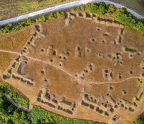‘TURBOCHARGED SUCCESS’
How and where we live is one of the most important questions we can ask ourselves. Much of what we understand about history and about our own times flows from exploring that subject.
Since the first urban settlements in Mesopotamia around 4000BC, cities have acted as gigantic information exchanges; the dynamic interaction of people in the dense, cramped metropolis has generated the ideas and techniques, revolutions and innovations that have driven history.
Until the year 1800, no more than 3-5% of the global population lived in sizeable urban areas, but this tiny minority had a disproportionate effect on global development. Cities have always been humankind’s laboratories, the forcing houses of history.
Humans thrive when they share knowledge, collaborate and compete in face-to-face settings.
At the beginning of the 20th century, the traditional city was a place of pessimism, not hope; the devouring industrial metropolis imprisoned its people, poisoning their bodies and minds; it was bringing about social breakdown.
You’re reading a preview, subscribe to read more.
Start your free 30 days





